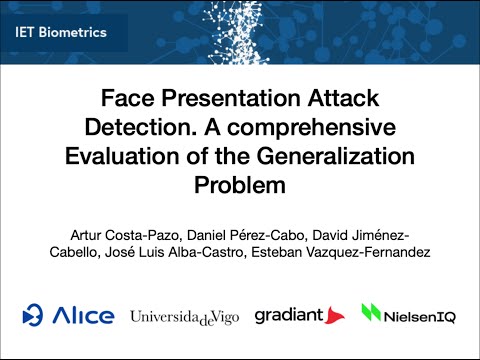gradgpad
Project description
gradgpad 🗿 



👉 The GRAD-GPAD framework is a comprehensive and modular framework to evaluate the performance of face-PAD (face Presentation Attack Detection) approaches in realistic settings, enabling accountability and fair comparison of most face-PAD approaches in the literature.
🙋 GRAD-GPAD stand for Generalization Representation over Aggregated Datasets for Generalized Presentation Attack Detection.
🤔 Abstract
Face recognition technology is now mature enough to reach commercial products, such as smart phones or tablets. However, it still needs to increase robustness against imposter attacks. In this regard, face Presentation Attack Detection (face-PAD) is a key component in providing trustable facial access to digital devices. Despite the success of several face-PAD works in publicly available datasets, most of them fail to reach the market, revealing the lack of evaluation frameworks that represent realistic settings. Here, an extensive analysis of the generalisation problem in face-PAD is provided, jointly with an evaluation strategy based on the aggregation of most publicly available datasets and a set of novel protocols to cover the most realistic settings, including a novel demographic bias analysis. Besides, a new fine-grained categorisation of presentation attacks and instruments is provided, enabling higher flexibility in assessing the generalisation of different algorithms under a common framework. As a result, GRAD-GPAD v2, a comprehensive and modular framework is presented to evaluate the performance of face-PAD approaches in realistic settings, enabling accountability and fair comparison of most face-PAD approaches in the literature.
🙏 Acknowledgements
If you use this framework, please cite the following publication:
@article{https://doi.org/10.1049/bme2.12049,
author = {Costa-Pazo, Artur and Pérez-Cabo, Daniel and Jiménez-Cabello, David and Alba-Castro, José Luis and Vazquez-Fernandez, Esteban},
title = {Face presentation attack detection. A comprehensive evaluation of the generalisation problem},
journal = {IET Biometrics},
volume = {10},
number = {4},
pages = {408-429},
doi = {https://doi.org/10.1049/bme2.12049},
url = {https://ietresearch.onlinelibrary.wiley.com/doi/abs/10.1049/bme2.12049},
eprint = {https://ietresearch.onlinelibrary.wiley.com/doi/pdf/10.1049/bme2.12049},
abstract = {Abstract Face recognition technology is now mature enough to reach commercial products, such as smart phones or tablets. However, it still needs to increase robustness against imposter attacks. In this regard, face Presentation Attack Detection (face-PAD) is a key component in providing trustable facial access to digital devices. Despite the success of several face-PAD works in publicly available datasets, most of them fail to reach the market, revealing the lack of evaluation frameworks that represent realistic settings. Here, an extensive analysis of the generalisation problem in face-PAD is provided, jointly with an evaluation strategy based on the aggregation of most publicly available datasets and a set of novel protocols to cover the most realistic settings, including a novel demographic bias analysis. Besides, a new fine-grained categorisation of presentation attacks and instruments is provided, enabling higher flexibility in assessing the generalisation of different algorithms under a common framework. As a result, GRAD-GPAD v2, a comprehensive and modular framework is presented to evaluate the performance of face-PAD approaches in realistic settings, enabling accountability and fair comparison of most face-PAD approaches in the literature.},
year = {2021}
}
This publication has been financed by the "Agencia Estatal de Investigación. Gobierno de España" ref. DIN2019-010735 / AEI / 10.13039/501100011033
💻 Installation
pip install gradgpad
🚀 Getting Started
The best way to learn how to use the GRAD-GPAD framework is through the Notebook examples available in:
📺 Video Tutorial
👍 Annotations
Labels and annotations are available through the Python package.
Example:
from gradgpad import annotations
print(f"Total GRAD-GPAD Annotations: {annotations.num_annotations}")
print(annotations.annotated_samples[0])
annotations.print_semantic(annotation_index=0)
These annotations are also publicly available in json file.
📰 Reproducible Research
$ gradgpad --reproducible-research -o <output-folder>
Use gradgpad --help to check available parameter
$ gradgpad --help
usage: gradgpad [-h] [--reproducible-research] [--zip]
[--output-path OUTPUT_PATH]
optional arguments:
-h, --help show this help message and exit
--reproducible-research, -rr
Create a folder with reproducible research results
--zip, -z Zip result folder
--output-path OUTPUT_PATH, -o OUTPUT_PATH
Output path
🤔 Contributing
There is a lot of work ahead (adding new categorizations, datasets, improving documentation...), feel free to add and propose any improvements you can think of! If you need help getting started, don't hesitate to contact us ✌️
- 🛠️ Environment
>> python -m venv venv
>> source venv/bin/activate
(venv) >> pip install lume
(venv) >> lume -install
- ✅ Testing
(venv) >> lume -test
Project details
Release history Release notifications | RSS feed
Download files
Download the file for your platform. If you're not sure which to choose, learn more about installing packages.












